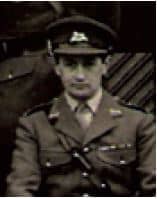Ronnie Dallas was born in 1921 and was educated at Wellington. He volunteered for the Army at the outbreak of War but was initially placed in the Army Reserve.

He was eventually called up in October 1940, and after his basic training was sent to the RAC OCTU in February 1941.
He was granted an emergency commission in The 3rd Hussars in May 1941 and travelled to the Middle East with the Queen’s Bays in September of the same year.
He joined 3H in Cyprus where the Regiment was on rest in December 1941 and was posted to ‘B’ Squadron.
Shortly thereafter, ‘B’ Squadron received orders to return to the Delta. At the time the popular belief was that it would be their responsibility to draw up Shermans prior to the return of the Regiment to the desert.
This, however, was not the case, and they were reissued with their old Mark VIBs and embarked for the Far East. They disembarked in Sumatra on 14th February 1942 and almost immediately moved to Java where they found themselves under Dutch command and alongside some Australian infantry.
This was a period of considerable uncertainty in the Dutch East Indies, but on the 4th March his troop fought a successful action protecting the Australian left flank in totally unsuitable terrain of paddy fields and thick jungle.
This was the only action in which the squadron was involved and was one in which the other troop leader subsequently receive the MC.
Four days later, the Dutch commander in Chief capitulated and ‘B’ Squadron was ordered to destroy their tanks and surrender. The Squadron Leader gave permission for anybody who wished to try and escape to do so, and Ronnie made the attempt with three other ranks, but their efforts were doomed from the start because the Dutch had destroyed all the boats.
They wandered for about 250 kilometres and eventually came across two Australians and persuaded some natives to build a boat for them. This, however, was a pretty unsuccessful attempt, and as the Japanese knew where they were and were constantly demanding that they surrender, they set said in their boat which was completely unseaworthy.
They decided that they had no option but to surrender.
At the time one of the group had typhus, two others had malaria, they were very short of money, and the natives were becoming hostile.
Subsequently, Ronnie was incarcerated in five prison camps until his liberation at the end of August 1945.
During his time in captivity he was, like so many other prisoners, subjected to brutal beatings, and suffered severe starvation and disease.
The slightest misdemeanour received the harshest of punishments, and Ronnie was always remembered by members of the Regiment who were imprisoned with him as setting an outstanding example to those around him.
On one occasion Ronnie was tied to a tree and Japanese soldiers with fixed bayonet repeatedly charged towards him, pulling away at the last moment.
Following his liberation, he arrived back in the UK at the end of October 1945, but was not fit to return to the Regiment which was then serving in Palestine until the autumn of 1946. He rejoined ‘B’ Squadron which returned to the UK in August 1948, and then almost immediately to BAOR.
During his time in Germany, Ronnie proved himself to be an outstanding show jumper, winning many competitions and narrowly missing selection for the 1952 Olympics.
He was also a keen sailor and a very competent helmsman, although he seemed to find it difficult when reading charts in the Baltic to understand the difference between metres ad fathoms.
He was instrumental in the re-establishment of the 3H Hunt and was, with the then Commanding Officer Charles Peel, the first Joint Master.
From 1950 to 1952 he was Adjutant to the North Somerset yeomanry, but before taking up this appointment it was necessary for him to undergo serious surgery to his right arm which had failed to recover from the damage inflicted on him whilst a prisoner.
On one occasion whilst in a transit camp in the Middle East he moved into a local hotel, much to the annoyance of the camp staff, claiming that the camp bore many similarities to the camps in which he had spend three and a half years as a prisoner of the Japanese. As a result he arrived back in the Regiment under open arrest.
Subsequently, Ronnie returned to Germany and after Regimental appointments and one with 7th Armoured Brigade, he retired in September 1957.
Almost immediately he left the Army he was appointed Honorary Secretary to the Duke of Beaufort’s Hunt, a task which was to prove very demanding but very satisfying for the next 30 years.
He established excellent relations with the local farmers and was President of the Malmesbury Young Farmer’s Club for over 30 years and was on the Committee of the Badminton Horse Trials for a similar period.
Whenever time allowed, especially in the summer, he continued to enjoy sailing, usually to France or the Channel Islands. A quiet, but determined, person who was admired and respected by all who knew him both in the Army and civilian life.


